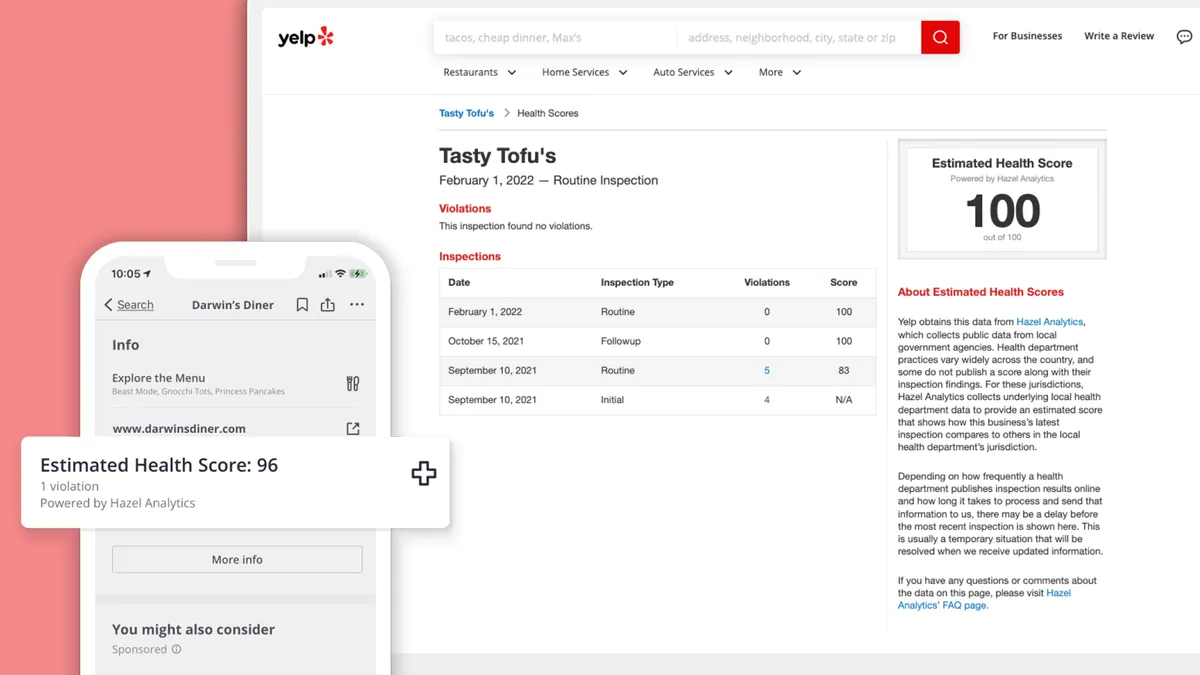Dive Brief:
- Yelp has partnered with Hazel Analytics to expand access to local health department data on its platform, according to a Yelp blog post. Hazel Analytics is a Seattle-based company that specializes in the use of data-driven technology solutions to improve food safety and public health, and monitors regulatory compliance at over 300,000 locations in the U.S. and Canada.
- Hazel Analytics will collect or estimate health scores for Yelp's nearly 700,000 pages, using data from health departments in 48 U.S. states as well as Toronto and Vancouver, British Columbia.
- The partnership builds on Yelp's health scores feature, which includes the Local Inspector Value-Entry Specification (LIVES) program, which launched in 2013 and features information about food safety, health scores and restaurant inspections. In 2020, Yelp expanded that program to include health alerts flagging restaurants with the worst health inspection violations.
Dive Insight:
Yelp will now share information about health inspection jurisdictions including nearly 70% of the U.S. population, standardizing health scores across its platform and filling in gaps that may exist because of varied health department practices or resources.
According to Yelp, the LIVES program has so far been a success, with health scores improving in Louisville, Kentucky, once those scores became easily accessible on Yelp. The company claimed publishing health scores on its platform led to a 9-to-14% decrease in restaurant inspection point deductions, and a 10% decrease in violations per inspection.
Yelp's assertions are echoed by a 2020 study from Cornell University's SC Johnson College of Business, showing that public disclosure of restaurant inspection scores in the Seattle market led to a decline in failing inspections.
Notably, Yelp's study estimated that Louisville may have avoided up to 140 food poisoning cases in 2014, after the scores became more accessible. Foodborne illnesses affect about 48 million people in the U.S. each year, leading to 128,000 hospitalizations and 3,000 deaths.
More consumers are seeking health inspection information and are motivated by the results they find. A 2019 survey from the state of Minnesota, for instance, found that over 94% of consumers want more access to restaurants inspection information, and more than 77% would use this information to decide where to eat. Most (roughly 72%) want to see inspection results online.
Further, research from Harvard Business School and reported by the Chicago Tribune shows the addition of health scores to restaurant review pages led to a 13% decrease in purchase intentions for low-scoring restaurants.
The company's existing LIVES program has faced criticism from restaurant operators, who claim not all health inspections are the same. Differences in inspection methodology have caused concern among operators, according to the Washington Post. In New York City, for instance, a letter grade is issued, while in the Miami area, inspectors use a pass/fail system. Some cities don't summarize their information at all.
According to Yelp, because health scores are not standardized, Hazel Analytics uses data to estimate a score based on a 100-point scoring system to show how a restaurant's inspection compares to others in the same jurisdiction.









